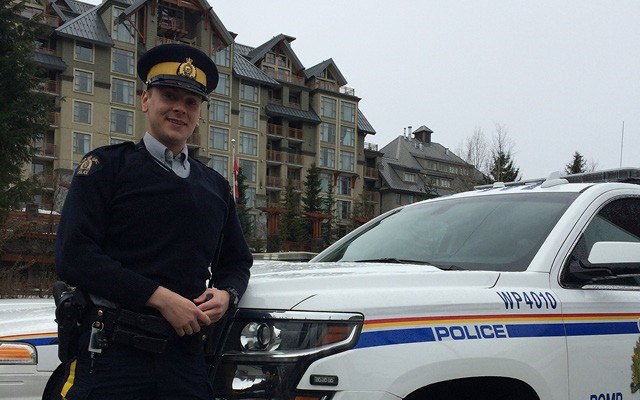Over the span of eight days in March, Whistler RCMP Const. Mike Zwicker nabbed three people suspected of driving while impaired by marijuana.
"All three times I heard: 'I didn't think the police could do anything about this,'" Zwicker relayed.
Drug users beware: The 28-year-old is the Whistler RCMP's newly minted drug-recognition expert (DRE) after completing a specialized training course that will give the detachment a leg up on driving enforcement.
"The idea behind the course is to train officers to recognize suspected drug-impaired drivers, all through a systematic, standardized 12-step process," explained Zwicker.
Previously, the local police force had to rely on a roadside screening device and a field sobriety test to determine if a driver was impaired, only allowing officers to issue a 24-hour driving suspension. It was either that or wait for a DRE to arrive from the Lower Mainland. Now, with a DRE in-house and on-call 24-7, Mounties can respond more quickly, and with the full weight of the law behind them.
"The DRE allows us to lay a criminal charge," said Zwicker.
A recent trend local officers have noted is that drivers' intoxication levels often weren't matching the results of a roadside screening demand. In such a case, Zwicker will be called in to conduct a psychophysical exam that measures clinical signs of inebriation such as pulse rate, blood pressure and body temperature. From there, Zwicker will render his opinion indicating whether he believes a driver is impaired and under which drug category.
"It's one thing you can't game," noted Zwicker. "Even if we have a drug-impaired individual, you can't alter things like your pulse or your blood pressure."
Given the popularity of recreational marijuana in the resort, combined with the looming prospect of legalization, Zwicker believes Whistler is trending towards an increase in drug-impaired drivers.
"It's a concern for a lot of people, but we are implementing the procedures to effectively deal with this issue," he said.
A common perception is that cannabis actually makes drivers more cautious on the road, but Zwicker said the medical evidence doesn't bear that out.
"I like to tell people to look at cannabis this way: it speeds you up on the inside and slows you down on the outside. So the No. 1 factor to give away a cannabis-impaired driver is speed. People are not slowing down, they're actually driving faster," he explained. "It affects the fine motor skills required to drive."
In December, it was announced that several police forces across the country would take part in a pilot project testing the effectiveness of certain roadside testing devices to detect drugs.
Although Whistler isn't involved in the project, Zwicker welcomed any tool that helps police get drug-impaired drivers off the road.
"Anything we can get to help us do our job, I think is in the best interest not only of the public, but police officers as well," he said.




